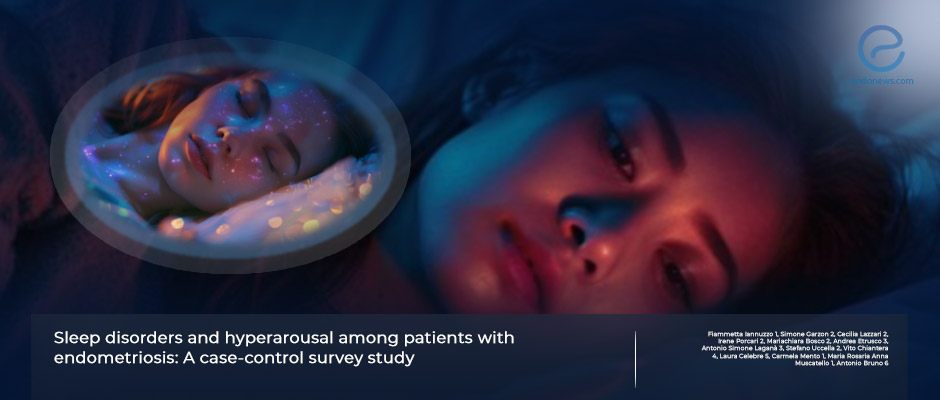Sleep Disorders and Endometriosis
Sep 13, 2024
Sleep Disturbances and Hyperarousal in Women with Endometriosis
Key Points
Highlight:
- This study addresses a significant gap in the literature by exploring the relationship between endometriosis, hyperarousal, and sleep disorders.
Importance:
- Understanding hyperarousal in women with endometriosis and its impact on sleep disturbances can guide targeted interventions to enhance sleep quality and well-being
What's done here:
- This case-control survey examines the link between endometriosis, hyperarousal, and sleep disorders.
- Participants were recruited via online platforms and social media.
- A total of 847 women (430 endometriosis, 417 controls) were surveyed using Hyperarousal Scale, Pittsburgh Sleep Quality Index, and Insomnia Severity Index.
Key results:
- Women with endometriosis had poorer sleep quality, with higher Pittsburgh Sleep Quality Index scores compared to controls.
- They also scored higher on the Insomnia Severity Index, indicating more severe insomnia.
- Higher hyperarousal levels, as measured by the Hyperarousal Scale, were found in these women, suggesting increased physiological alertness contributing to sleep disturbances.
- Path analysis showed that hyperarousal partially mediated the link between endometriosis and sleep disorders, explaining 22.3–27.8% of the relationship, indicating its significant but not sole role.
Limitations:
- The survey, partly conducted during the COVID-19 pandemic, may have affected participants' quality of life and sleep.
- The use of online questionnaires may have introduced response bias.
Lay Summary
A new study published in the European Journal of Obstetrics & Gynecology and Reproductive Biology by a team lead by Bruno et al., reveals that endometriosis is associated with decreased sleep quality and hyperarousal.
Endometriosis is a chronic condition affecting millions of women, often causing severe pain, heavy menstrual bleeding, and infertility. In addition to these symptoms, it has a significant impact on quality of life, with many women experiencing increased levels of anxiety, depression, and sleep disturbances. Poor sleep can disrupt daily functioning, affecting mood, focus, and overall health.
This study examined the relationship between endometriosis and sleep disorders, specifically focusing on insomnia, while introducing the concept of hyperarousal. Hyperarousal is a heightened state of alertness resulting from an imbalance in the nervous system, making it difficult to relax and fall asleep. The researchers sought to determine whether hyperarousal contributes to the sleep problems experienced by women with endometriosis.
The study surveyed 847 women, 430 of whom had endometriosis. The findings revealed that women with endometriosis were more likely to experience sleep disturbances and elevated levels of hyperarousal compared to those without the condition. Hyperarousal was found to explain part of the association between endometriosis and sleep disorders, accounting for about one-quarter of the relationship.
Based on these findings, the researchers suggest that addressing hyperarousal in women with endometriosis who experience sleep problems may be beneficial. By targeting hyperarousal, interventions could help improve sleep quality. Further research is needed to confirm hyperarousal’s role in this population and to explore effective treatment options for reducing sleep disturbances in women with endometriosis.
Research Source: https://pubmed.ncbi.nlm.nih.gov/39053089/
Endometriosis Sleep Sleep disorders Hyperarousal

